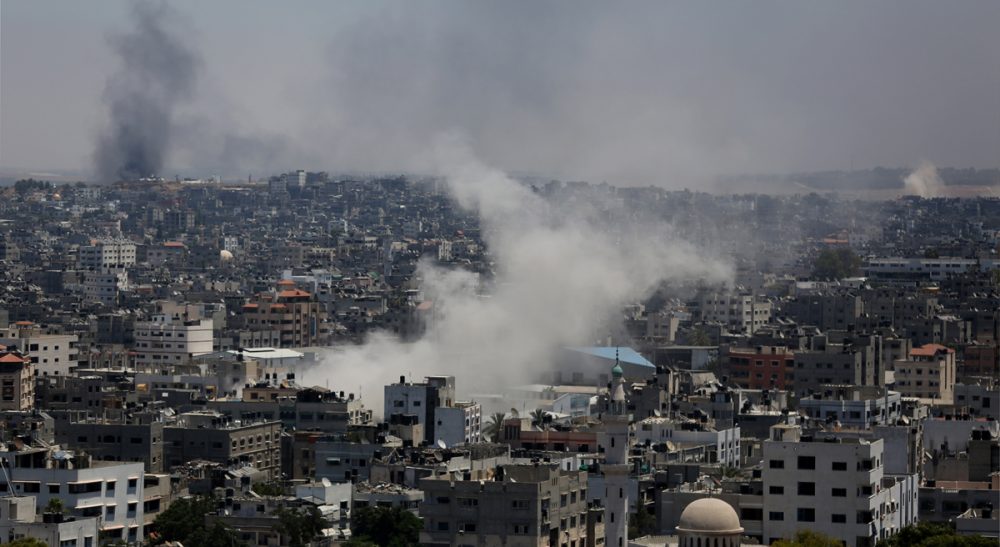Advertisement
'Mowing The Grass' In Gaza: A War In The Mideast Every Four Years?

**A note from the editor: This is one of two opinion pieces about the Mideast conflict on Cognoscenti today. The other is here.**
A metaphor can be a dangerous thing. Research from the field of psychology suggests that metaphors can shape our thinking, highlighting certain aspects of a problem, while de-emphasizing or even hiding others.
An especially pernicious metaphor of increasing prominence in the Israeli strategic vocabulary is “mowing the grass.” I first encountered it some years ago in a private meeting of American and Israeli security analysts considering the problem of Iran’s nuclear program.
Civilian casualties [in Gaza] are mounting, and Israeli analysts are talking about 'mowing the grass' to explain their strategy.
Most of the Israelis in the room advocated military strikes against Iran’s nuclear sites. An American colleague pointed out that a military strike would set back Iran’s program no more than two to four years, and that one can’t bomb the knowledge of how to build a centrifuge out of the heads of Iranian engineers.
To this, a former Israeli official replied, “…we’ll just bomb them again and keep bombing them every four years, like mowing the grass.” The Americans in the room were aghast. A war in the Middle East between regional powers every four years?
It was a shocking suggestion, partly because no modern country has ever adopted a strategy of active, continuous warfare, and partly because it was offered in such an off-hand manner. In the years since that meeting, I have frequently heard Israeli analysts advocate a “mowing the grass” approach to Iran.
Today, that metaphor is being been applied anew in a disturbing context: Gaza. Israel has invaded Gaza to quell Hamas’s rocket attacks, and, now, to destroy its tunnel networks. Civilian casualties are mounting, and Israeli analysts are talking about “mowing the grass” to explain their strategy.
Last week, Efaim Inbar and Eitan Shamir published a short paper for the Begin-Sadat Center for Strategic Studies (BESA) entitled, “Mowing the Grass in Gaza.” Inbar, who is director of BESA and a professor at Bar-Ilan University, is a longtime, mainstream figure in Israeli strategic studies.
In their paper, Inbar and Shamir argue that, “…calls from the Israeli Left for reaching a 'political solution' are totally unrealistic.” They further note that, “Those who forlornly ask 'when is this going to end?' and use the cliché 'cycle of violence' have psychological difficulties digesting the facts that there is no solution in sight.” Their conclusion: “Against an implacable, well-entrenched, non-state enemy like the Hamas, Israel simply needs to 'mow the grass' once in a while in order to degrade enemy capabilities. A war of attrition against Hamas is probably Israel’s fate for the long term.”
The notion that repeated attacks on Gaza are nothing more than “mowing the grass” raises serious moral and strategic questions. Cutting down civilians, like the children playing on that Gaza beach, is not like cutting blades of grass. To compare the two is dehumanizing. And to embrace a policy that entails the killing of hundreds, if not thousands, of civilians with each application violates the conscience, if not the basic rule of law. Use of force should always be a last resort, not a premeditated policy of first choice.
Cutting down civilians, like the children playing on that Gaza beach, is not like cutting blades of grass. To compare the two is dehumanizing.
It is also bad strategy. If one sets aside the civilians and focuses only on Hamas and related groups, it quickly becomes apparent that the grass metaphor is profoundly misleading. Grass does not learn from each mowing; it does not develop new capabilities. By contrast, over the course of a decade, it has become clear that militants in Gaza are acquiring better rockets – and, now, drones — and reaching deeper into Israeli territory. Their new targets include Tel Aviv Airport and the Dimona nuclear reactor.
Israel’s missile defenses have defeated these attacks, but despite the virtual absence of Israeli casualties from the rocket launches, the Netanhyahu government felt compelled to mount a large-scale invasion with the onerous objective of demilitarizing Hamas.
Put another way, to be “effective,” Hamas’s rockets don’t have to hurt anyone. It is enough that they reach deep into Israel. Does anyone actually believe that the next time this happens, Hamas’s rockets will be less sophisticated? We live in a time when electronics and even drones grow cheaper, more capable and easier to acquire. In short, “mowing the grass” is an unsustainable policy in the modern world.
It’s also wrongheaded. Inbar and Eitan argue that a political solution is “unrealistic,” thus the need for endless, repeated military attacks. But a political solution is the only realistic path to peace and stability for Israel and the region. Hamas and others cannot continue their rocket launches, kidnappings and terror attacks. But Israel cannot continue the occupation, draconian blockades and ever expanding settlements – including those that undermined Secretary Kerry’s most recent diplomatic efforts.
Of course, there is plenty of blame to go around, not just for Israel and the Palestinians, but for Egypt and others in the region. However, a refusal to address the core issues will prevent the one path that has any hope of protecting Israel’s security in the long term: a negotiated settlement.
In the meantime, Israeli analysts – and indeed all military strategists — should banish the phrase “mowing the grass.”
A metaphor can be a dangerous thing. It can even kill.
Related:
